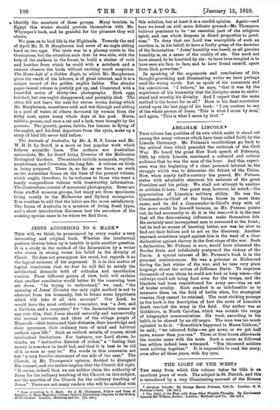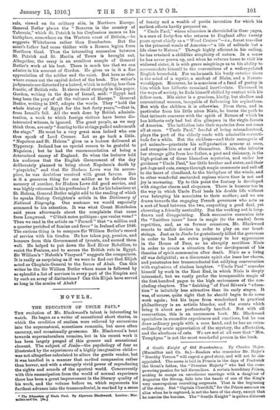THE LIGHT OF THE WEST.t
THE essay from which this volume takes its title is as excellent piece of work. The subject is St. Patrick, and this is introduced by a very illuminating account of the Roman • Abraham Lincoln. By George Haven Putnam, Litt.D. London : G. P. Putnam's Sons. [ed. net.] t The Light of the West, with Some Other Wayside Thoughts. By Lieutenant. General Sir William Butler. -London: Methuen and Co. [58. net.] rule, viewed on its military side, in Northern Europe. General Butler places the " Banaven in the country of Tabernia," which St. Patrick in his Confessions names as his birthplace, somewhere on the Western coast of Britain,—he suggests Whitehaven rather than Dumbarton. But the saint's father had come thither with a Roman legion from Northern Gaul. Thus the interesting connexion between St. Patrick and St. Martin of Tours is brought out. Altogether, the essay is an excellent sample of General Butler's work at his best. There is much too that we can admire in his account of Gordon. He gives ua in it a fine appreciation of the soldier and the saint. But here as else- where comes out the capital defect of the book. The writer's judgments are distorted by a hatred, which is nothing less than frantic, of British rule. It shows itself strongly in this paper. Gordon, writing in the days of Ismail, said : " Egypt had long been the prey of all the vultures of Europe." General Butler, writing in 1907, adopts the words. They "hold the whole history of Egypt for the last forty years,"—that is, from Ismail's fall. All the work done by British adminis- tration, a work to which foreign visitors have borne dis- interested witness, is ignored. The great people, as we may think them, are only " dancing to the strings pulled underneath the stage." He must be a very great man indeed who can thus speak of Lord Cromer. Let us go back a little. "Napoleon and St. Helena" gives us a lecture delivered at Tipperary. Ireland has no special reason to be grateful to Napoleon ; but he had the recommendation of being a determined enemy of England. So when the lecturer told his audience that the English Government of the day deliberately planned to bring about Napoleon's death by " pinpricks," and that Sir Hudson Lowe was its accom- plice, he was doubtless' received with great favour. But is it a generous thing for one soldier so to defame the memory of another, for Hudson Lowe did good service, and was highly esteemed in his profession P As for his behaviour at St. Helena, General Butler might add to the reading of which be speaks Bishop Creighton's article in the Dictionary of National Biography. One sentence we would especially commend to his attention. It was what Count Montholon said years afterwards about the complaints that came from Longwood. " C'etait notre politique : que voulez eons ? " Then we read in the article on " Parnell " that "a million and a quarter perished of famine and fever" in Ireland after 1846. The curious thing is to compare Sir William Butler's record of service with his tirades. He has taken pay, pension, and honours from this Government of tyrants, and earned them well. He helped to put down the Red River Rebellion, to resist the Fenian, and to secure the British rule in Egypt. Sir William's " Naboth's Vineyard" suggests the comparison. It is really as surprising as if we were to find out that Elijah acted as Chaplain-General to the forces of Ahab. Can this writer be the Sir William Butler whose name is followed by so splendid a list of services in every part of the Empire and by such an array of distinctions P Can this Elijah have served so long in the armies of Ahab ?







































 Previous page
Previous page